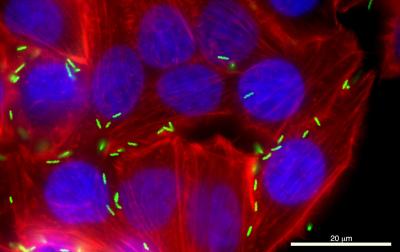
Credit: WSU
PULLMAN, Wash. – Washington State University researchers have discovered a protein that could be key to blocking the most common bacterial cause of human food poisoning in the United States.
Chances are, if you’ve eaten undercooked poultry or cross contaminated food by washing raw chicken, you may be familiar with the food-borne pathogen.
“Many people that get sick think, ‘oh, that’s probably Salmonella,’ but it is even more likely it’s Campylobacter,” said Nick Negretti (’20 Ph.D.), a lead member of the research team in Michael Konkel’s Laboratory in WSU’s School of Molecular Biosciences.
According to a study on the research recently published in Nature Communications, a secreted protein known as CiaD facilitates cell entry by Campylobacter and takes control of important cell processes by changing the composition of a protein complex inside the cell.
By gaining insight into the infection process and the specific actions of the Campylobacter secreted proteins, the work gives the WSU team and the rest of the field a foundation to understanding why infections occur and persist.
Until the Konkel Lab’s latest finding, the functions of the bacterium’s proteins and how they infect the cell were largely unknown.
“We knew these things were happening, but we didn’t know how,” said Negretti. “Now, if we can stop this process, disease won’t happen.”
The work was funded by a 5-year, $1.9 million grant from the National Institutes of Health and builds on two decades of research in the Konkel Lab.
Most often known for the nausea, vomiting and bloody diarrhea that comes with it, once ingested, Campylobacter jejuni secretes proteins that infiltrate the cells lining the intestinal tract, which allows it to hide from the immune system.
The bacteria account for 400 to 500 million cases of diarrhea annually, and the World Health Organization recognizes it as a serious threat due to its antibiotic resistance.
The infection is also correlated with stunted linear growth in impoverished children, and in developed countries, a higher incidence of Guillain-Barré syndrome, when the body’s immune system attacks the nerves.
The research was a seven-year collaborative effort, using the latest molecular biology and biochemistry methods.
The work was done in partnership with researchers Geremy Clair and Joshua Adkins with the Pacific Northwest National Laboratory. Using mass spectroscopy, Adkins and Clair were able to study protein-to-protein interaction that helped the WSU researchers narrow their focus and uncover the target of CiaD.
Konkel said the research would not have been completed without post-doctoral fellow Prabhat Talukdar and graduate students Courtney Klappenbach and Cody Lauritsen leading the work through its final stretch amid the pandemic.
Now, the researchers are hopeful the work will lead to real-world solutions, in particular finding ways to prevent the pathogen from stunting growth in children.
“With this finding, we can speculate that processes like this that affect the cell could impact the intestinal cell’s ability to form the correct structures to absorb nutrients,” Negretti said. “While this is a mechanistic level of understanding, the answers to how the bacteria is specifically affecting cells in the body could have broader ranging impacts into understanding the public health importance of this pathogen.”
The team also looks forward to learning the functions of other secreted proteins.
A major breakthrough into understanding C. jejuni disease was made in 1999 when the Konkel Lab discovered that proteins are secreted from the bacterium. In 2009, the CiaD protein was identified by Jeffrey Christensen, a post-doctoral fellow in the laboratory.
“We then identified CiaD was delivered to the host cells in 2013,” Konkel said. “A major question for the past 20-years has been: what are these secreted proteins and what do they do? This is just the first protein to have an identified cell target.”
###
Media Contact
Mike Konkel
[email protected]
Original Source
https:/
Related Journal Article
http://dx.




